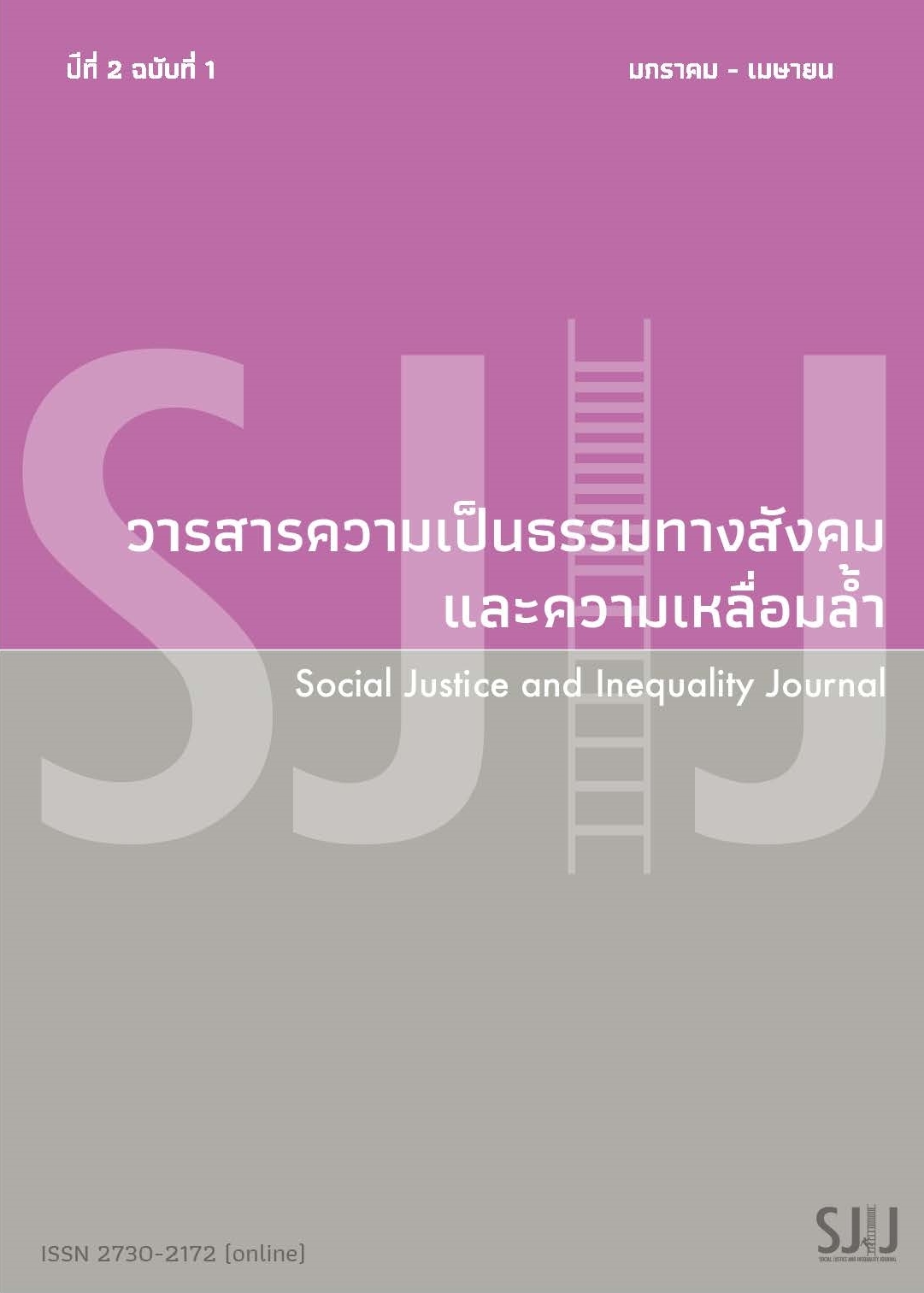Evidence-Based Policy within Thailand’s Reform Initiatives (2010-2013): Re-examination of limitations and biases
นโยบายบนฐานข้อมูลเชิงประจักษ์ในกระบวนการปฏิรูปประเทศไทย (พ.ศ. 2553 – 2556): การทวนสอบข้อจำกัดและอคติ
Keywords:
Evidence Based, Policy, Biases, Reform, ConflictAbstract
The rising popularization of evidence-based policy in the United Kingdom since 1999 has changed the way of policy making from the ideological led-based to evidence based. As Thailand launched its country reform initiative in 2009, the evidence-based policy approach was endorsed within the reform process. Theoretically, two kinds of biases could be found within the policy process. While the ‘technical bias’ politicizes the scientific process, the ‘issue bias’ depoliticizes the policy process. The purpose of this article is to explore the challenges and opportunities of the evidence-based policy in the reform process of Thailand. Thailand’s reform policy approach will be inspected and discussed regarding its limitation and biases. Both technical and issue biases are founded within the reform policy process. Although the reform initiative is expected to be the reconciliation platform for the country political conflict, its technical bias, which defined success as policy recommendation, has neglected political process as policy dialogue platform. The exclusion of political inequality advocators has caused the uneven policy formation process, which included only social and economic inequality advocators. Hence, the proposed policy recommendations could not link with the main social need. Additionally, the policy issues proposed by specific advocators are not related with overall policy problems. As the review process was the main policy research methodology, unavailable data of most marginalized population and absent of main strategic issues are overlooked. Both technical and issue biases have caused exclusion of many population groups, especially the red shirt people, from the reform policy process. Even if limitations and biases in policy process could not be avoided, conducting policy process with awareness of these could make the difference.
References
Akira, S. (2014). Technocracy and Thaksinocracy in Thailand: Reforms of the Public Sector and the Budget System under the Thaksin Government. Southeast Asian Studies, 3(2), 46.
Banks, G. (2009). Evidence-Based Policy Making: What is It? How Do We Get It? (SSRN Scholarly Paper ID 1616460). Social Science Research Network. https://papers.ssrn.com/abstract=1616460
Barnes, A., & Parkhurst, J. (2014). Can Global Health Policy be Depoliticized? A Critique of Global Calls for Evidence-Based Policy. In The Handbook of Global Health Policy (pp. 157–173). John Wiley & Sons, Ltd. https://doi.org/10.1002/9781118509623.ch8
Bullock, H., Mountford, J., & Stanley, R. (2001). Better Policy Making. Center for Management and Policies Studies.https://web.archive.org/web/20081105172829/http://www.nationalschool.gov.uk/policyhub/docs/betterpolicymaking.pdf
Burls, A., Gold, L., & Clark, W. (2001). Systematic review of randomised controlled trials of sildenafil (Viagra) in the treatment of male erectile dysfunction. The British Journal of General Practice: The Journal of the Royal College of General Practitioners, 51(473), 1004–1012.
Cabinet Office. (1999). Modernising Government. Cabinet Office.
Cameron, D. (2009, November 10). The Big Society. Conservatives. https://web.archive.org/web/20120714070101/http://www.conservatives.com/News/Speeches/2009/11/David_Cameron_The_Big_Society.aspx
Cloke, P., Milbourne, P., & Widdowfield, R. (2001). Making the homeless count? Enumerating rough sleepers and the distortion of homelessness. Policy & Politics, 29, 259–279. https://doi.org/10.1332/0305573012501341
Commission on Social Determinants of Health. (2008). Closing the gap in a generation. WHO. http://nccdh.ca/resources/entry/closing-the-gap-in-a-generation-health-equity-through action-on-the-social
Crisis Group Asia Report. (2010). Bridging Thailand’s Deep Divide (No. 192; p. 35). Crisis Group Asia Report. https://ciaotest.cc.columbia.edu/wps/icg/0019294/index.html
Dalpino, C. (2011). Thailand in 2010: Rupture and Attempts at Reconciliation. Asian Survey, 51(1), 155–162. https://doi.org/10.1525/as.2011.51.1.155
E. Miller, D., Flyvbjerg, B., & Sampson, S. (2002). Making Social Science Matter: Why Social Inquiry Fails and How It Can Succeed Again (Vol. 31). https://doi.org/10.2307/3090087
Eaton, G. (2010, September 28). The speech we’ve longed to hear from a Labour leader. New Stateman America. https://www.newstatesman.com/blogs/the-staggers/2010/09/simple- truth-miliband-brown
Hammersley, M. (2013). The Myth of Research-Based Policy & Practice. SAGE Publications Ltd. https://doi.org/10.4135/9781473957626
Innes, J. (2002). Improving Policy Making with Information. Planning Theory & Practice, 3(1), 102– 104. https://doi.org/10.1080/14649350220117861
Lerner, D., & Lasswell, H. D. (1951). The policy orientation. In he policy sciences: Recent developments in scope and method (pp. 3–15). Standford University Press. https://www.researchgate.net/publication/284863551_The_policy_orientation
Marmot, M. G., Rose, G., Shipley, M., & Hamilton, P. J. (1978). Employment grade and coronary heart disease in British civil servants. Journal of Epidemiology and Community Health, 32(4), 244–249.
McCargo, D. (Ed.). (2002). Reforming Thai Politics. Nordic Institute of Asian Studie.
Munos, M. K., Walker, C. L. F., & Black, R. E. (2010). The effect of oral rehydration solution and recommended home fluids on diarrhoea mortality. International Journal of Epidemiology, 39 Suppl 1, i75-87. https://doi.org/10.1093/ije/dyq025
Nostitz, N. (2009). Red vs. Yellow. 1. Thailand’s crisis of identity. White Lotus Press.
Parkhurst, J. O. (2017). The politics of evidence: From evidence-based policy to the good governance of evidence. Routledge.
Pawson, R., & Tilley, N. (1997). Realistic Evaluation. SAGE. http://dx.doi.org/10.1016/S0362-3319(03)00108-3
Pongsawat, P. (2014). Socio-cultural Cleavages and Red Shirt-Yellow Shirt Conflicts in Thailand’s Politics: A Critical Multiculturalism View. In N.-K. Kim (Ed.), Multicultural Challenges and Sustainable Democracy in Europe and East Asia (pp. 107–128). Palgrave Macmillan UK. https://doi.org/10.1057/9781137403452_6
Sutcliffe, S., & Court, J. (2005). Evidence-Based Policymaking: What is it? How does it work? What relevance for developing countries? . 50.
Thailand Future Foundation. (2014). สู่การปฏิรูปที่ปฏิบัติได้จริง: Getting Reform Right. Thailand Future Foundation. https://thaipublica.org/wp- content/uploads/2014/02/TFF_Policywatch_Getting_Reform_Right-2.pdf
WHO. (2009). More research needed into childhood diarrhoea. WHO. https://doi.org//entity/mediacentre/news/releases/2009/diarrhoea_research_20090310/en/index.html
Wright, J. S. F., Parry, J., & Mathers, J. (2007, May). “What to do about political context?” Evidence synthesis, the New Deal for Communities and the possibilities for evidence-based policy [Text]. https://doi.org/info:doi/10.1332/174426407781172270
คณะกรรมการปฏิรูป [Reform Committee]. (2011). แนวทางการปฏิรูปประเทศไทย: ข้อเสนอต่อพรรค การเมืองและผู้มีสิทธิเลือกตั้ง [Thailand Reform Guideline: Recommendations for Political Parties and Voters]. สำนักงานปฏิรูป [Reform Office]. http://library.nhrc.or.th/ULIB/dublin.php?ID=1504
ธนาพล อิ๋วสกุล. (Ed.). (2560). การปฏิรูปการเมืองไทย: ฐานคิดและข้อเสนอว่าด้วยการออกแบบรัฐธรรมนูญฉบับประชาชน ปี 2540. สำนักงานกองทุนสนับสนุนการวิจัย.
มติคณะรัฐมนตรี 29 มิถุนายน 2553 [Cabinet Resolution 29 June 2010], (2010).
สำนักข่าวอิศรา. (2011). สรุปข้อเสนอของคณะกรรมการปฏิรูป (คปร.) [Summary of Reform Committee Recommendations]. https://www.isranews.org/isranews/download/1397/25243/18.html
เสนอรัฐบาลใหม่ใช้กลไกสมัชชาสุขภาพเป็นกระบวนการปฏิรูปประเทศ. (2014, June 18). Hfocus.org เจาะลึกระบบสุขภาพ. https://www.hfocus.org/content/2014/06/7448
“อานันท์”ตั้งแล้วกก.ปฏิรูปประเทศไทย. (2010, July 8). [Newspaper]. คมชัดลึกออนไลน์. https://www.komchadluek.net/news/politic/65763
Downloads
Published
Issue
Section
License
Copyright (c) 2023 Social Justice and Inequality Journal

This work is licensed under a Creative Commons Attribution-NonCommercial-ShareAlike 4.0 International License.




